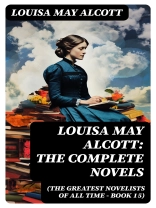In ‘Louisa May Alcott: The Complete Novels, ‘ the renowned author encapsulates the essence of 19th-century American literature through her insightful and pioneering narratives. This comprehensive collection features her most beloved works, including the iconic ‘Little Women, ‘ alongside lesser-known gems that reveal the depth of her literary craftsmanship. Alcott masterfully navigates themes of familial bonds, gender roles, and social expectations, all presented in an accessible style that merges realism with sentimental overtones, characteristic of the period’s literary context. Her ability to weave poignant, relatable characters into intricate plots not only entertains but also invites readers to reflect on the societal norms of her time. Louisa May Alcott, an ardent feminist and pioneer of American literature, was shaped by her own experiences in a transcendent household, where intellectual discourse was encouraged. Growing up during the tumultuous years leading into the Civil War, she found inspiration in her own struggles and triumphs, infusing her narratives with authenticity and emotional depth. Alcott’s contributions extend beyond fiction, as she was also a staunch advocate for women’s rights, which influenced her depiction of strong, independent female protagonists. This edition is a must-read for anyone interested in classic literature, gender studies, or the evolution of American storytelling. Alcott’s novels serve as a vital link to understanding the complexities of her era while offering timeless insights into human relationships. Dive into this complete collection to explore the unparalleled legacy of Louisa May Alcott and discover why her works continue to resonate with readers today.
Over de auteur
Louisa May Alcott stands out as a preeminent figure in American literature, particularly acclaimed for her enduring novel ‘Little Women’. Born on November 29, 1832, in Germantown, Pennsylvania, Alcott grew up in a progressive family deeply engaged with intellectual and social reform movements, notably transcendentalism. Her father, Amos Bronson Alcott, was a philosopher and educator, who instilled in her a love of literature and writing. Her life was chronicled with a mix of fortitude and warmth in her semi-autobiographical novel ‘Little Women’ (1868), which was part of a series that included ‘Good Wives’ (1869), ‘Little Men’ (1871), and ‘Jo’s Boys’ (1886). She penned her novels under the societal constraints faced by women of her era, yet her work transcended these confines, inspiring generations of readers with tales of female empowerment, integrity, and familial bonds. Alcott’s literary style frequently mirrored her personal beliefs, including feminism, abolitionism, and civil rights, making her work resonant with social and moral undercurrents. A prolific writer, her canon includes suspenseful gothic thrillers and romantic stories, written under pseudonyms. ‘Louisa May Alcott: The Complete Novels’ reiterates her distinguished place in the literary canon, featuring her compelling storytelling and revolutionary vision that challenged and changed the fabric of American young adult fiction. Alcott’s legacy of challenging gender norms and portraying multifaceted characters endures, securing her position as a critical figure in the pantheon of American writers. She passed away on March 6, 1888, but left behind a body of work as an advocate of women’s rights, education, and the transcendentalist movement that continues to celebrate the human spirit.












